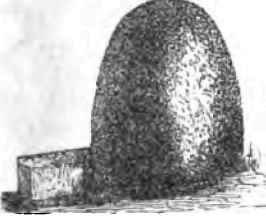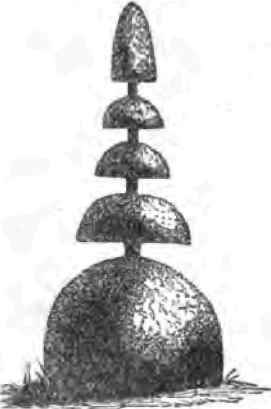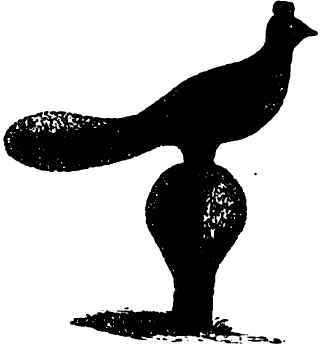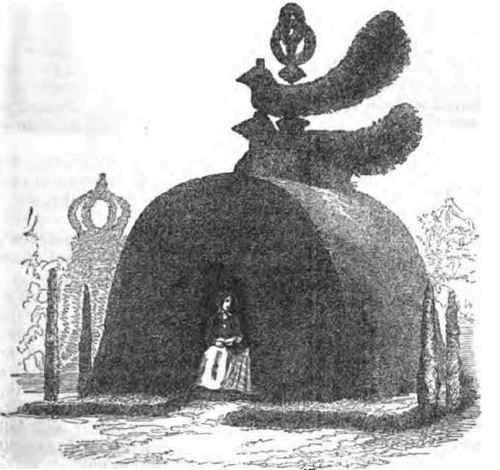Topiary Work
Description
This section is from "The Horticulturist, And Journal Of Rural Art And Rural Taste", by P. Barry, A. J. Downing, J. Jay Smith, Peter B. Mead, F. W. Woodward, Henry T. Williams. Also available from Amazon: Horticulturist and Journal of Rural Art and Rural Taste.
Topiary Work
That satirical robber, the memorable Augustus Tomlinson, of Bulwer, says some where in "Paul Clifford," "One main reason why men who have been great are disappointed when they retire to private life, is this: memory makes a chief source of enjoyment to those who cease eagerly to hope; but the memory of the great recalls only that public life which has disgusted them. Their private life hath slipped insensibly away, leaving faint traces of the sorrow or the joy which found them too busy to heed the simple and quiet impressions of mere domestic vicissitude." I would have the retired man to be active, his mind directing his hands, and thus possessing a resource for every day. The private life should slip somewhat insensibly away. It may be taught to do so in a workshop and a lathe looking out upon a lawn or a garden: in the latter let him see some results of his own handy-work; something to which a direction has been given by his own exertion - something in which nature has assisted art.
And the training of vines, shrubs, and even trees, is one of those artifices which will continue to give pleasure by carrying out a preconceived idea, and realizing it by degrees. It has been the fashion to rail at artificial scenes: Pope Bet the fashion, and the witlings followed their leader; but it is by no means ascertained that the human mind, the average intellect, is not capable of deriving pleasure from the surprises which art may introduce. I have myself derived more satisfaction in youth from a huge box-bush hollowed out by time and art, where concealment and quiet could be enjoyed behind a leafy screen, than from mountain scenery, or any scenery but a waterfall. You may assemble all the new evergreens as well as the old in a given Spacc; they may all be growing beautifully according to nature's laws, and delighting your educated taste. Show these to a regular inbred citizen, or to a child, and as respects their education to the subject, their minds differ but little, each being a blank sheet in which no correct lines have been drawn, and they will make little impression.
The expression may be "Ah!" or "Yes." Suddenly introduce the same parties to a nook in which are some healthy bushes growing in the shape of an animal, a cross, a crown, or any correctly outlined object, and the exclamation is at once altered; "Oh dear! how very curious ! See that dog ! how natural!" Your visitor forgets the sublime Cedar of Lebanon, and carries in his memory only the odd, combined, however, with the element which is never to be lost sight of, that human ingenuity, and time, and expense of some kind, have been lav-bished for your enjoyment.
I am not about to recommend that therefore all your trees and bushes should be artificially shaped and cut into grandiose representations; I would confine the art to moderate dimensions, to an out-of-the-way corner, perhaps, or to a spot somewhat sequestered, to which the eye should be unexpectedly introduced; and even here I would not expose my ambition by carving the ludicrous or the monstrous. A fountain represented in a Norway Fir may be eminently beautiful, when a centaur would be simply ridiculous.

Fig. 1. OSAGE ORANGE.

Fig. 2. OSAGE ORANGE.
There has been too much said against the artificial in landscape gardening; what is it, after all, but artificially imitating nature, the great teacher as well as mother?
The topiary art is so called, as Salasius thinks, from the Greek word for a rope, because the process of construction was conducted chiefly by means of cords and strings. It was much practised in the seventeenth century. Casaubon describes a scene which existed in his early days somewhere in the suburbs of Paris, on so elaborate a scale, that it represented Troy besieged, with the two hosts, their several leaders, and all other objects in their full proportion.

Fig. 3. Yew.

Fig. 4. Yew.
There is a fashion in these things, and I am inclined to see topiary work again a little in vogue. Loudon was not disinclined to its moderate existence; under the limitations above indicated, it should never be utterly neglected. Evergreens, and those of the slow-growing kinds, are the best for permanency, and for winter as well as summer adornment; but almost any tree or shrub may be subjected to the shears, the knife, the cord, and the wire, even those of loose and straggling habit. The common White Pines at Mr. Hunnewells have already been mentioned in this magazine; but the Yews, and the Box. and the Cedars, offer the best inducements; the Junipers, too, and many others, will occur to the mind of the experimenter, according to the object he wishes to represent.
Fig. 5.

Fig. 6.

Fig. 7.

Fig. 8.

Fig. 9.

I have taken some pains to prepare a few drawings, which, while they will give an idea of what can be accomplished by a little labor and time, are only suggestive; they may be varied ad libitum.
The Crataegus or Thorn family are very easily put into shape by shears and interlacing, but there is no plant that I have tried that is so rapidly brought into subjection as the Osage Orange. It takes any shape desired, and in a very short time. Figures 1 and 2 represent two specimens in my own garden which have been respectively trimmed for three and two years, and are now very attractive in summer.
At Elvaston Castle, in England, great expense has been lavished in the purchase of old evergreen plants, either trimmed into shapes or suitable for that purpose. Figures 3 and 4 represent shaded seats, and are of Yew.
Crowns and coronets are readily produced with a little care. The two next cuts, Figs. 5 and 6, are patterns easily imitated, and may be of Osage Orange, Yew, or Juniper.

Fig. 10. Yew.
A monument in Yew, Fig. 7, may be readily produced. Figs. 8 and 9 are more elaborate, and will require more time to perfect.
The next cut, Fig. 10, has already been published, but as it is appropriate to the present article, I repeat it. The single plant of which it consists was removed to Elvaston Castle at a cost of one thousand dollars.
Why should one blush when asked to defend pursuits which administer more to taste and refinement than to pecuniary profit? It would never do to balance taste against the want of it, or mental pleasures against such I as are more solid, but I would at any time rather consort with the owner of a garden who worked in it himself, than with the owner of a huge farm whose mind was employed on his commercial profits:
"Nor does he govern only, or direct, Bat much performs himself. No works, indeed, That ask robust, tough sinews, bred to toil, Servile employ; but suck as may amuse. Not tire, demanding rather skill than force/'
Continue to:


